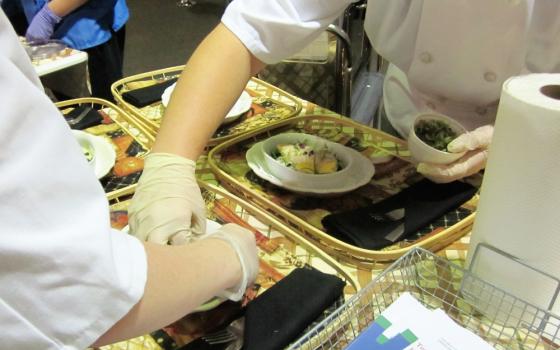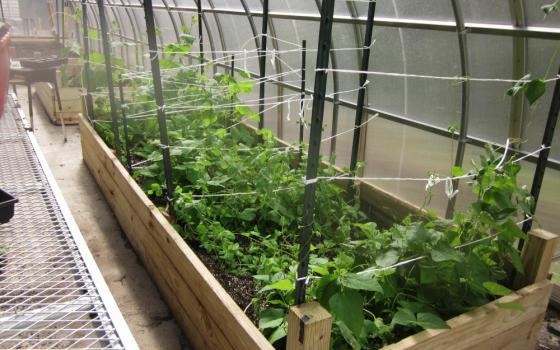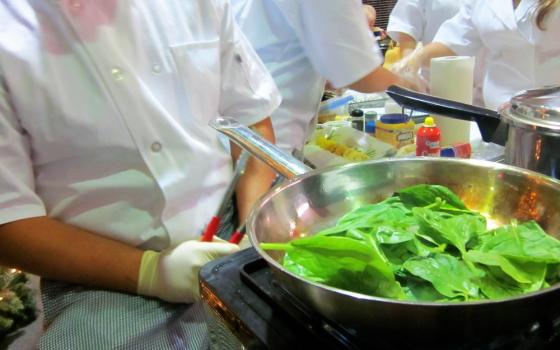Notes from the Field are reports from young women volunteering in ministries of Catholic sisters. The project began in the summer of 2015 when, working with the Catholic Volunteer Network, we enlisted four young women working in Honduras, Thailand, Ethiopia and the United States to blog about their experiences. The fall series presents two more women, both volunteering with sisters' ministries in the United States.
______
In my previous post, I delved into some of the joy I have experienced living and working at Big Laurel Learning Center, an ecological preserve and retreat center. My introverted, outdoorsy side loves this arrangement. However, being a Notre Dame AmeriCorps volunteer means my service needs an education focus, so I split my workweek between Big Laurel and the high school at the bottom of the mountain.
(Author's note: For privacy reasons, I am not using the name of the school where I work or any of my fellow staff members.)
I spend four days a week in school, aiding in classes and trying to look more comfortable than I feel. Placed in the agriculture department because of my love of farming, I am working with a teacher who is new to the area and overwhelmed with his classes. Most days are a scramble to come up with enough activities to entertain five classes in the school greenhouse.
Students have an excellent radar for figuring out when teachers are wasting their time and behave accordingly. I've watched students methodically break greenhouse equipment and seen others lie about simple things like planting or watering. Assignments are rarely turned in, and bad grades are normal. As an aide, I feel pressure to step up and raise the classroom standard, but my lack of teaching experience is a big stumbling block.
With only my own coddled, private high school experience to use as comparison, this strikingly different school has been pretty unnerving for me. Teachers gripe about the low achievement potential in their students, and unsurprisingly, the students have matched this standard. Dysfunctional family backgrounds, an apathetic culture, and low-quality elementary schooling are all explanations I've heard for why the students can't perform at national standards.
My limited experiences so far have given me plenty of opinions on how the school works, though I'm sure increased experience will alter my perspective. As I see things, teachers seem limited by a few administrative policies that undermine their authority. For example, students must be allowed to go to the bathroom whenever they ask, and late work is encouraged to be accepted, no matter when it is turned in. These policies have a place and mostly benefit students, but for others, such relaxed standards creates an environment where students are rarely penalized for unprofessional behavior, so they graduate unprepared to go to college or even hold a job with concrete deadlines. I'm witnessing a vicious cycle where lack of respect creates lower standards that demand even less respect. Much of my time has been spent struggling through emotions about these problems, and I'm not anywhere close to working them out.
To say it is not a life-affirming environment is an understatement. More days than not, I sit at my desk, scrolling through Facebook until my eyes glaze over, feeling embarrassed by my inability to make much difference in the atmosphere of the class. Some days, I come home miserable and drained, snapping at my husband for petty things.
But the beauty of living and working in a community is that my Big Laurel co-workers encouraged me to seek out a different placement at the high school. At their urging, I started a conversation with the vice principal that led to me spending two of my four days at the school in the cooking department.
ProStart, the official name of the class, is part of the National Restaurant Association and is a curriculum focused on preparing students to work in the food industry someday. Cooking classes seemed like a natural fit for me because preparing food is only a few steps removed from growing it, and the interactive nature of the class would allow me to work with students in a less restrictive environment than a typical classroom. Unlike the agriculture department, ProStart has a set plan for every day of the week, culminating in running a microrestaurant that prepares and serves lunch to the teachers on Fridays.
My first day in class was awkward. Unlike what I had experienced almost everywhere else in the school, this was a class of well-behaved students who knew what was expected of them and were willing to do it. Everyone knew what to do with themselves except for me. So I hovered, trying to break into student conversations, desperately hoping not to look as out of place as I felt.
But day two was a turning point for both me and the department. For the first time in school history, the ProStart class was going to enter a cooking competition! Five of the best students from the class were going as a team to be pitted against rival schools, many with several teams. They had no expectations beyond gaining experience. Swiss chicken with sautéed greens was on the menu, but the class was stymied about what to use as their required local ingredient.
Finally, I had a moment where I could live up to my label as an aide. Three weeks before, I had planted microgreens with an agriculture class, greens that would be at their peak right in time for the competition. My experiences with both classes were now an asset. The greens were fetched from the greenhouse and harvested in preparation for the competition.
On the day of the competition, I helped in any way I could: driving the supplies over to the competition, documenting the event in photos, and tasting all the free samples I could find. Our students were visibly nervous, but they had practiced their recipe and knew what to do. The cooking went smoothly, and before long, a small crowd had gathered around their booth, asking for samples. There were so many people, in fact, that our booth ran out of samples long before any other team. The judges must have agreed with the wisdom of the crowd, because our rookie team came away with first place.
It was therapeutic for me to see unrestrained glee on the faces of students who usually were so guarded with their enthusiasm. Seeing kids from this difficult high school take pride in their work and get rewarded for it was even better than that first-place prize.
But that was pretty great, too.
[Lydia Noyes and her husband, Ian, are volunteers with the Notre Dame Mission Volunteers AmeriCorps program. She is a 2015 graduate of Calvin College in Grand Rapids, Michigan. She has degrees in environmental studies and international development.]




